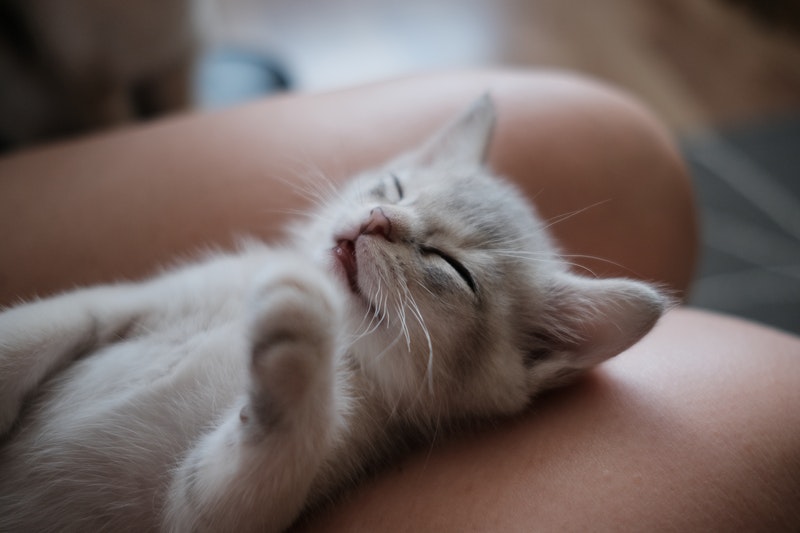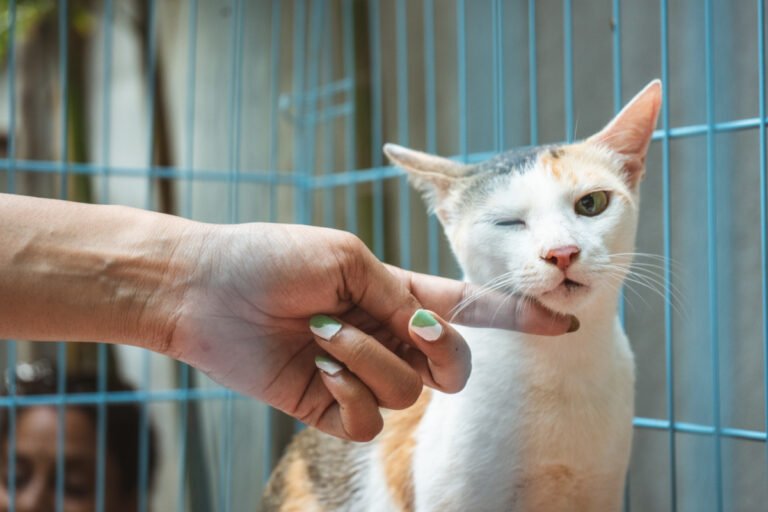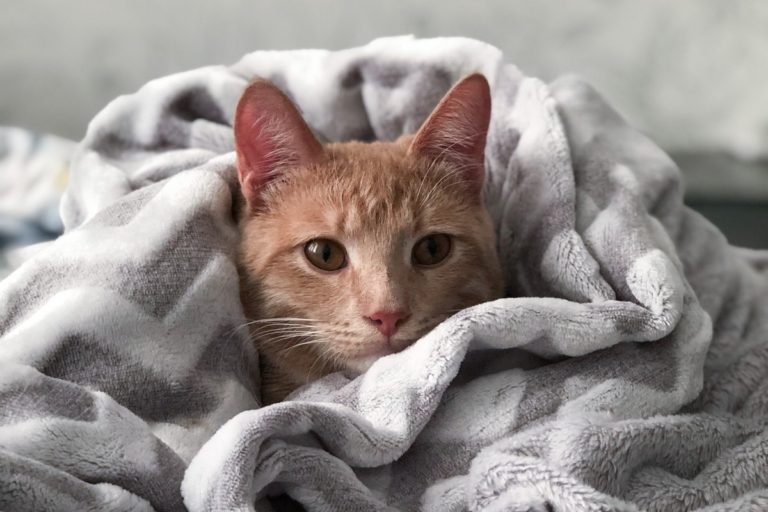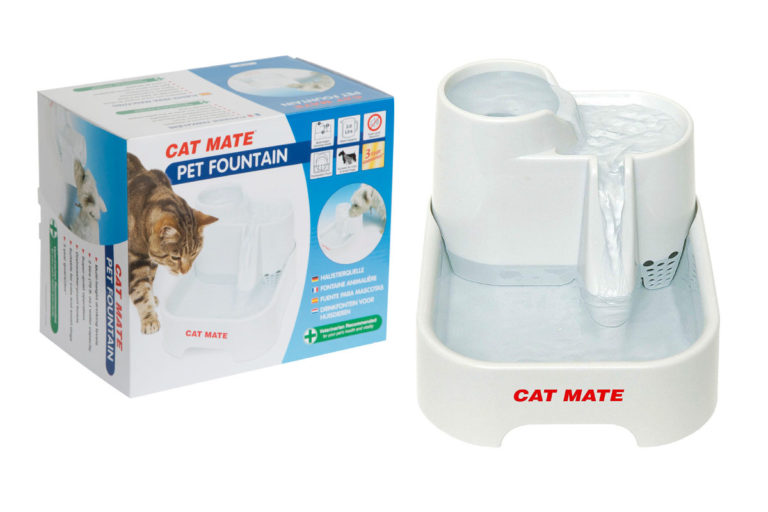We are all familiar with the soft, soothing sound of a cat’s purr. The rhythmic vibration has a calming effect and is even said to have true healing powers. But what if your cat stopped purring all together? Is this a cause for concern?
DISCLAIMER: This post may contain affiliate links. If you click one of these links and decide to make a purchase, we may receive a small commission. This comes at no extra cost to you and helps to keep the site alive and up to date. If you want more information, please review our Privacy Policy. Thank you for your support!
How Do Cats Purr?
Before we dive into possible reasons why your cat stopped purring, it is important to consider how a cat’s purr actually comes about. For many years, scientists actually didn’t know the answer to this question. But knowing how cats purr is pivotal to understanding why they might stop doing it.
The most commonly accepted explanation for how cats purr is that the brain sends a signal to the larynx, or voice box. In response, the laryngeal muscles activate and start rapidly opening and closing the glottis, which is the space between your cats vocal cords. As your cat breaths and air passes through the larynx and glottis, it starts to vibrate at a frequency of 25 to 150 hertz, which causes the purring sound. The beauty of this is that it works both when your cat breaths in and when they breath out, resulting in a continuous, soothing purr.
Related Post: How Does A Cat Purr Work?
Nothing is more adorable than a happy cat curled up purring in your lap. But how does a cat purr work exactly? And why do they do it? Read our guide to find out!Is It Voluntary Or Involuntary?
One thing scientists still can’t agree on, however, is whether the brain signal that starts the purr is voluntary or involuntary. Do cats purr because they want to, or because they have to?
Those who consider purring as an involuntary act of the nervous system, attribute it to the same type of brain activity that governs things like breathing and your heartbeat. These types of actions don’t require conscious thought to activate them or keep them going. Instead, they are controlled by so-called neural oscillators, which are brainwaves that form repetitive, rhythmic patterns of neural activity.
Other researchers believe that purring is controlled by hormones, specifically endorphins. The main function of endorphins is to inhibit pain signals being sent to the brain. When someone (human, cat, or otherwise) experiences pain or severe discomfort, the pituitary gland starts to release endorphins into the bloodstream, which act to relieve the experienced pain and stress. Purring seems to have the same effect, which is why researchers believe the two are connected.
Even others, though, believe that purring is entirely voluntary, meaning your cat consciously decides whether to purr or not. That does seem to be the kitty-way when it comes to pretty much everything else, so it seems plausible at the very least.
Why Do Cats Purr?
Although there is still much that we don’t know about a cat’s purr, scientists and cat behaviorists agree that there are several distinct conditions under which cats are likely to purr. Contrary to what you might think, cats purr for more reasons than just happiness. If we look at when cats tend to purr, we can distinguish four distinct reasons for purring.
Purring For Pleasure
The most obvious reason for a cat to be purring is to show joy and contentment. You’ll surely have noticed that your cat starts purring when you pet them or pick them up. Many cats also purr when they are eating, signaling that they are enjoying their meal. Your cat feels bonded to you because you protect and care for them, and their purr can be seen as an expression of their love and appreciation for you.
Purring For Food
Another common reason for cats to purr is when they want something from you, like food or attention. In this case your cat will approach you, already purring and perhaps meowing, while clearly trying to make eye contact. Their purr will sound a bit louder and more vigorous than usual.
Purring For Peace
Cats will emit a rhythmic, uniform purr when they are around other cats. Mother cats, for instance, use purring to communicate with their newborn kittens. The purr helps the kittens to find their mother and nurse from her when their eyes are still closed. It also comforts them and makes them feel safe. Older cats tend to start purring when there are younger, stronger cats in their vicinity to signal that they are not looking for a confrontation and wish to coexist peacefully.

Purring For Healing
Unfortunately, continuous purring can be a sign that your cat is in distress and trying to comfort themselves. If your cat sits alone purring and not really engages with you like normal, or shows other signs of illness or discomfort, it is time for a trip to the vet.
Cats that are recovering from surgery or suffering from chronic ailments are also known to purr a lot. This is what led researchers to believe that the rhythmic nature of a cat’s purr may actually have healing powers. The vibration caused by purring is said to help repair wounds and increase bone density.
Related Post: Is Pet Insurance Worth It For Indoor Cats?
Is pet insurance worth it for indoor cats? Read this guide to learn about pet insurance for cats and calculate if it is really worth it for your indoor cat.My Cat Stopped Purring; Should I Be Worried?
There are several reasons why a cat could stop purring. Of course, no cat purrs all the time, so you shouldn’t be alarmed if your cat still purrs some of the time. But if your cat stopped purring all together, there is cause for worry. A cat that doesn’t purr could be suffering from problems with their airways, which can be life threatening if left untreated.
The first thing to do is observe your cat’s behavior for signs of distress or illness. Are they acting out of the ordinary? Are they refusing to eat or drink? Did their body language or posture change? Did they experience any physical or emotional trauma recently? These are all clues your veterinarian will need to diagnose your pet.
Respiratory Issues
Most respiratory issues in cats aren’t likely to cause your cat to completely stop purring. However, they can definitely affect how your cat’s purr sounds and might be a precursor to something worse. Which is why we feel the need to include them here. The symptoms you want to look out for are:
- wheezing, or noisy breathing;
- excessive panting;
- lethargy;
- coughing;
- refusing to play or exercise;
- elevated body temperature;
- weak limbs;
- dark discoloration of the tongue;
- raspy or soft meow;
- anxiety and stress.
If you recognize any of these symptoms in your cat, you should take them to the vet for a checkup. Respiratory issues are usually diagnosed using blood and urine analysis, along with X-ray, fluoroscopy, bronchoscopy or ultrasound imaging. In extreme cases where the larynx is suspected to be involved, your vet might need to perform a laryngoscopy, evaluating the structural integrity of the larynx by inserting a camera into your cat’s mouth. Your cat will of course need to be sedated for this.
Laryngeal Paralysis
Although it is rare in cats, the most obvious reason a cat stops purring completely is that they are suffering from laryngeal paralysis. This occurs mostly in older cats with an average age of about 11 years old. When the larynx is paralyzed, the glottis remains fixed in the same position, so no purring sound is produced. If the glottis is completely closed when the paralysis occurs, your cat won’t be able to breathe.
If you find your cat gasping for air, rush them to emergency care immediately! There your cat’s airways will be checked for any obstructions and, in case of a partial or full laryngeal paralysis, your vet will likely make a small, temporary incision in the windpipe (tracheotomy) to improve your cat’s oxygen intake. Your cat will then need to undergo surgery to reopen their airways.
Cats can live relatively normal lives with a paralyzed larynx. However, it does put them at an increased risk of developing secondary respiratory ailments, specifically aspiration pneumonia. Aspiration pneumonia is caused by foreign materials being breathed in and irritating the lining of the lungs. It is especially likely to happen if your cat vomits or regurgitates, or if you administer fluid medication incorrectly.
Cats with laryngeal paralysis are also at risk of overheating. Under normal circumstances, cats are able to regulate their body temperature by panting. But when the glottis is fixed, they aren’t able to take in those large gulps of refreshing air. Take care not to wear your cat out with too much play or exercise and put out a few extra bowls of water on warm days to help them out. Good hydration is essential for cats with laryngeal paralysis.
The Importance Of Pet Insurance
Needless to say, if your cat suffers from laryngeal paralysis, or other respiratory issues, you have a lot of extra vet visits to look forward to. The costs for taking care of an ailing cat can rack up quite quickly. For instance, the average cost for emergency care for a cat in respiratory distress is around 1,500 USD, not including aftercare.
Don’t be fooled into thinking that it won’t happen to you. Even if laryngeal paralysis is rare, there are countless other reasons and diseases why you could be taking your cat to the vet. In fact, around 1 in 3 pets need unexpected veterinary care each year. The best approach is to hope for the best, but expect the worst. That way you are always prepared when trouble comes knocking on your door.
Pet health insurance can be a genuine lifesaver. Just imagine: your cat suddenly goes into respiratory arrest and you don’t have the money to take them to emergency care. Are you just going to let your beloved feline die? Or are you smart and have you gotten yourself some insurance? I sure hope it’s the latter.
If you are in the US and looking for a great, affordable option for pet health insurance, then we can recommend Eusoh. Eusoh is not a traditional insurer, but a community health sharing plan. For a low monthly fee of only 17 USD they will reimburse not just your veterinary costs, but also costs for alternative care and pet wellness.
So what are you waiting for? Go check out Eusoh right now! If not for yourself, then do it for your cat.










